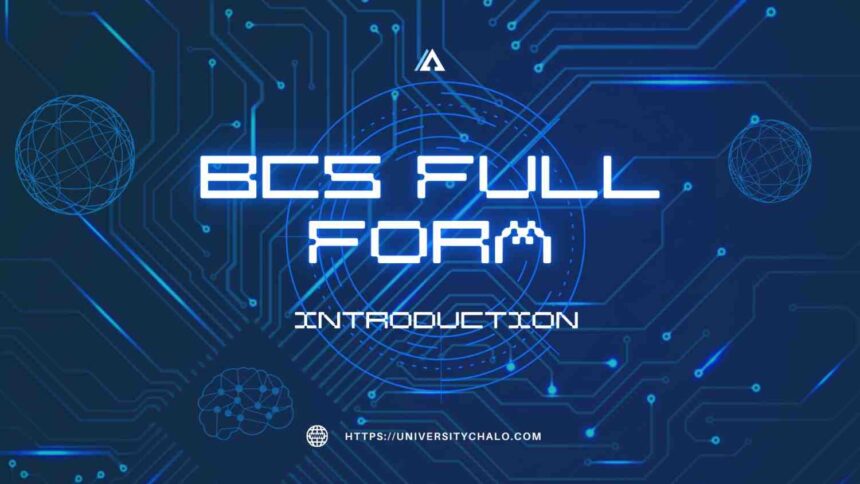The world of technology is evolving rapidly, and with it, the opportunities for growth and innovation in various sectors. One area where this evolution is being clearly seen is in the field of computer science. A core element in preparing for the future of technology is the BCS course (Bachelor of Computer Science), which has significantly evolved to meet the demands of tomorrow’s tech trends. This article explores the changing landscape of BCS, its importance in the modern world, and how it is preparing the next generation of tech professionals.
BCS Full Form and the Importance of the Course
Before diving deep into the evolution of BCS, it is essential to understand the BCS Full Form, which stands for Bachelor of Computer Science. This undergraduate degree program focuses on providing students with a foundational understanding of computer science and its applications. It equips learners with the necessary skills to excel in the tech world, preparing them for careers in software development, IT consulting, network security, and more.
The growing demand for tech professionals worldwide has made the BCS course even more relevant. Whether it is artificial intelligence, data science, cybersecurity, or software engineering, the course offers a solid foundation in all these areas. As technology continues to change at an exponential rate, the BCS course has adapted to provide the necessary training and expertise required to meet these challenges head-on.
The Role of BCS in Shaping Future Tech Trends
The evolution of the BCS course has closely followed the rapid advancements in technology. In the past, computer science courses primarily focused on core programming, mathematics, and systems theory. However, the tech landscape has shifted, and so has the curriculum of BCS programs. Today, the course emphasizes emerging technologies, such as artificial intelligence (AI), machine learning (ML), blockchain, big data analytics, and cloud computing.
As the tech world moves toward automation and AI-driven solutions, the BCS course is becoming more future-focused. Students are not only learning traditional programming languages but are also being trained in cutting-edge technologies that are shaping the future of the industry. For instance, machine learning is a critical area being integrated into modern BCS courses. This trend aligns with the growing importance of data-driven decision-making and predictive analytics in various fields.
Moreover, the integration of big data analytics into BCS programs allows students to grasp the importance of data management and its role in shaping future tech. Big data is revolutionizing industries such as healthcare, finance, and retail. Therefore, understanding how to manage and interpret large datasets has become a crucial skill for computer science professionals.
Preparing Students for the Future Job Market
One of the significant objectives of the BCS course is to prepare students for the rapidly changing job market. As the world becomes more connected, the demand for tech professionals continues to increase. The rapid adoption of digital technologies across all sectors has created a skills gap, with employers struggling to find qualified candidates. The BCS course plays a vital role in closing this gap by offering students a comprehensive understanding of computer science principles and equipping them with practical, real-world skills.
In addition to theoretical knowledge, many BCS programs now incorporate internships, collaborative projects, and industry-specific training. This approach ensures that students graduate with hands-on experience, making them more attractive to potential employers. Furthermore, the course encourages critical thinking, problem-solving, and creativity—skills that are invaluable in navigating the fast-paced tech industry.
The job opportunities for BCS graduates have diversified significantly in recent years. While traditional roles such as software developer, systems analyst, and network administrator continue to be in demand, new roles in emerging fields are also being created. Graduates with expertise in areas like AI, blockchain, and cybersecurity are finding themselves highly sought after, as companies seek to stay competitive in the ever-evolving digital landscape.
The Changing Nature of Technology
As technology continues to evolve, so too must the educational programs designed to teach the next generation of tech professionals. The increasing focus on cloud computing in BCS programs is a direct response to the growing demand for scalable, flexible, and cost-effective solutions. Cloud technology has transformed the way businesses operate, enabling them to access vast computational resources on-demand. As a result, BCS students are being trained to develop and manage cloud-based applications, which are now critical to businesses of all sizes.
Similarly, cybersecurity has become an integral part of modern BCS curricula. With the rise of cybercrime and the growing reliance on digital systems, cybersecurity skills are in high demand. The BCS course has evolved to include in-depth training on network security, ethical hacking, and cryptography. This ensures that students are equipped to protect sensitive data and defend against increasingly sophisticated cyber threats.
Blockchain technology is another area that has made its way into the BCS curriculum. Blockchain has the potential to revolutionize industries by providing secure, transparent, and decentralized systems. As more businesses explore the potential of blockchain for applications like digital currency, supply chain management, and voting systems, the need for professionals who understand the technology has surged.
The Global Impact of BCS Programs
The impact of BCS programs extends far beyond the classroom. As technology continues to shape the global economy, the role of computer science professionals becomes more important. Graduates of BCS programs are not only contributing to their local economies but are also influencing global trends. In developing countries, the availability of high-quality BCS courses has empowered young people to enter the tech workforce, creating a new generation of innovators and entrepreneurs.
The BCS course also plays a crucial role in driving technological advancements in emerging markets. By providing students with the necessary skills, these programs help foster innovation and entrepreneurship. Many BCS graduates go on to start their own tech companies or join startups, contributing to the growth of the global digital economy.
The Future of BCS: Preparing for Tomorrow’s Tech Trends
The future of the BCS course looks bright, with new technologies and trends continually emerging. As the tech world evolves, so too will the course curriculum, ensuring that students are prepared for the challenges of tomorrow. The increasing emphasis on AI, machine learning, and automation in BCS programs signals a shift toward a more specialized and advanced tech education.
In the future, we can expect BCS programs to integrate more advanced tools and technologies, preparing students to develop intelligent systems, autonomous applications, and next-generation technologies. Additionally, with the rise of quantum computing, BCS courses may begin to incorporate quantum programming languages and algorithms into their curriculum. Quantum computing holds the promise of solving complex problems that traditional computers cannot, and its inclusion in BCS education will provide students with the skills necessary to be at the forefront of this cutting-edge technology.
Furthermore, as the global workforce becomes increasingly digital, the need for remote work capabilities and digital collaboration tools will continue to rise. The BCS course will need to adapt to these changing dynamics by incorporating skills related to remote collaboration, digital communication, and virtual project management. These skills will be crucial for students as they enter a workforce that is more interconnected than ever before.
Conclusion
The BCS Full Form, or Bachelor of Computer Science, represents a vital path to understanding the rapidly evolving tech world. As technology continues to advance at a fast pace, BCS programs are continuously adapting to provide students with the knowledge and skills needed to thrive in tomorrow’s tech trends. With a curriculum focused on emerging technologies such as artificial intelligence, machine learning, cybersecurity, and blockchain, BCS graduates are well-positioned to make significant contributions to the future of technology.
The role of the BCS course is not only to educate but also to inspire the next generation of innovators, creators, and problem-solvers. By staying at the forefront of technological change, BCS programs are preparing students to excel in a world that is increasingly driven by digital transformation.
FAQs
What is the BCS Full Form? The BCS Full Form stands for Bachelor of Computer Science. It is an undergraduate degree program that focuses on computer science and its applications.
How has the BCS course evolved over time? The BCS course has evolved to incorporate emerging technologies like AI, machine learning, blockchain, and big data analytics, ensuring students are prepared for the future of tech.
What are the career opportunities after completing a BCS course? Graduates of the BCS course can pursue careers in fields such as software development, cybersecurity, data science, AI, and cloud computing, among others.
Is the BCS course relevant to the future of technology? Yes, the BCS course is designed to provide students with the skills needed to excel in tomorrow’s tech landscape, including emerging fields like AI and blockchain.
How does the BCS course contribute to global technological advancements? BCS programs prepare students to contribute to innovation and entrepreneurship globally, with many graduates going on to influence industries and drive the digital economy.


